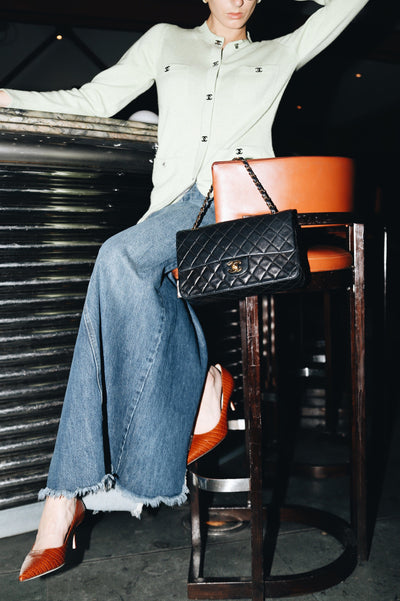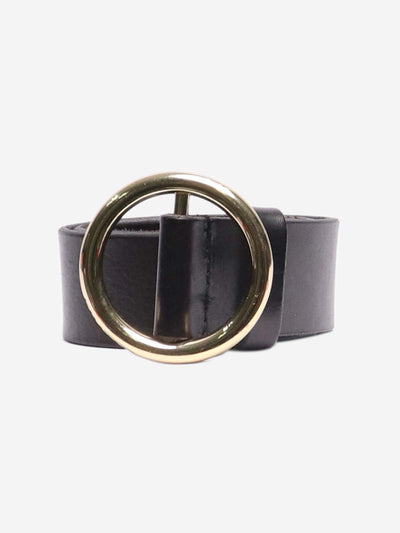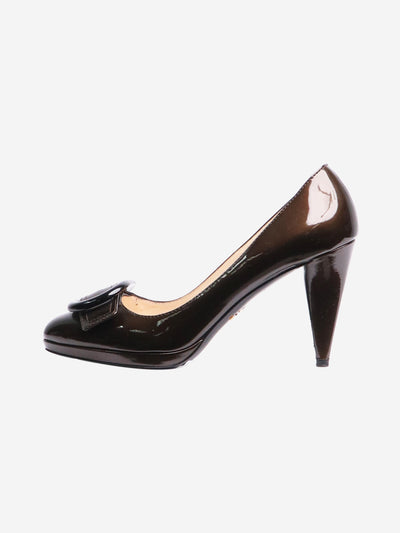2023 sustainable fashion trends: 10 luxury brands and their sustainable initiatives you need to know about
Posted on

In 2023, fashion brand’s continue to remain responsible for 10% of the world's carbon emissions. That’s even more than maritime shipping and international flights combined. As we approach Earth Day, let’s take a look inside 10 noteworthy sustainable fashion initiatives that luxury brands are implementing in 2023 to combat the planet-negative impact of the fashion industry.
But first, what even is sustainable fashion?
Sustainable fashion is an oxymoron. The relationship between sustainability and fashion is inherently incompatible. Whilst the industry operates under a linear ‘make, take, dispose’ linear business model, the relationship between fashion and sustainability remains inherently incompatible.
Sustainability is generally defined as the ability to be maintained at a certain rate or level and avoiding the depletion of natural resources in order to maintain an ecological balance. Thus no brand can be inherently sustainable, yet brands are taking it under their wing to forge a new future for fashion that places the planet and people at the forefront.
Covering a range of emerging sustainability trends; from digital passports and recycled packaging to next-gen fabrics and upcycling deadstock fabrics, discover how designer brands are incorporating circularity and transparency to their business models in new and exciting ways.
Up-Cycling
1. Gucci Continuum: A circular narrative by the Vault
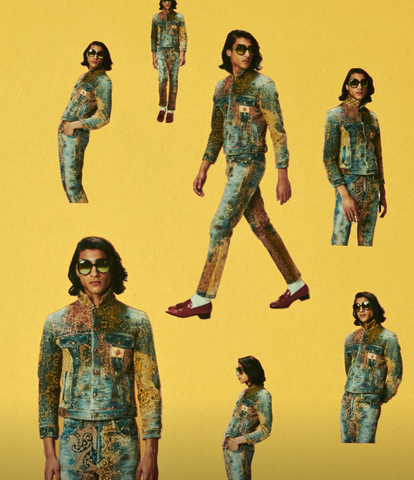
Gucci’s Culture of Purpose is continuing its commitment to sustainability in 2023 by achieving a series of sustainable goals by 2025, including reducing its carbon footprint by 40% and investing in transparent, ethically sourced materials.
Amongst our favourite of Gucci’s strides towards sustainable practices is their most recent initiative, Gucci Continuum: An initiative that invites young designers, makers and artists to extend the life cycle of deadstock and previous-season Gucci fabrics, pieces and accessories from their vintage vault. Keeping yesterday’s materials out of landfills, familiar Gucci motifs are made available to creatives who can reimagine and up-cycle them into new designs that reflect their aesthetic universe.
The first collection launched on March 16th in collaboration with 10 brands and designers. And let it be known, the outcome took the dialogue between fashion’s past and present to new levels of creative ingeniousness. Including sneakers by Vans; bomber jackets by Alpha Industries and Slam Jam; corsets by Alice Pons; designer bags by Hadakova; hats by Call of the Void and even art pieces ready-to-wear designer clothes by EGONLAB, Hodakova and Collina Strada and even literal pieces of art by DRx Romanelli – all the products are available to shop or marvel at through the Gucci Vault now. This is hands-down, a must-see.
Shop secondhand Gucci online here.
2. Lily Eve: Up-Cycling Hermes towels into luxury jackets
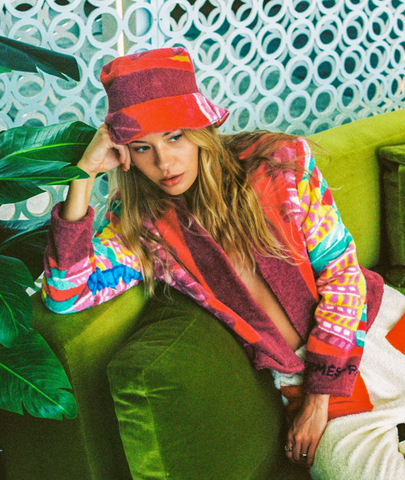
LilyEve’s sustainable up-cycling initiative is so wholesome it’s weep-worthy. 23 year old Lily C (Parsons graduate) and 86 year old Michael Wayne (former womenswear designer), crossed paths at the start of the pandemic. Fast forward a couple years, the unlikely but sweetest of pairings founded LilyEve: A slow and sustainable brand with a unique concept to give a second life to Hermes towels that might otherwise go to waste by up-cycling them into hand-crafted luxury jackets and short sets. Before you thought it couldn’t get any more wholesome, Lily’s family have now become Michael’s care-givers after his wife passed away 12 years ago.
Back to the brand, each piece has a one-of-a-kind and distinctive feel, combining the classic elegance of the Hermes beachwear staple accessory with modern and edgy touches. Lily sources the majority of the Hermes towels through resale sites, auction houses, estate sales. In the spirit of a no-waste sustainable policy, every last thread of the fabrics are used either for pathwark, pockets and even hats. LilyEve is a great opportunity for other designer brands to follow in the steps of Gucci and collaborate with independent designers to upcycle their deadstock fabrics
Shop preloved Hermes here.
3. Mulberry: “BAGS THAT LAST” Restoration Service
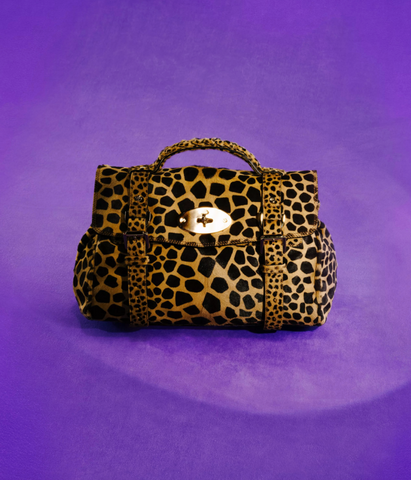
Mulberry has established the Mulberry Exchange, an in-store and digital platform that enables authenticated and beautifully restored classic bags to find a new owner. The goal is to makes bags last: extending the life-cycle of Mulberry bags. The Exchange also offers a buy-back scheme that enables customers to have their Mulberry bags authenticated and appraised, with the opportunity to put this value towards a new purchase.
The vintage and buy-back pieces have been carefully revived by Mulberry's restoration artisans before being offered at the Mulberry Exchange hub and in stores across the UK. You can book a one-on-one appointment to discover the collection in-store or through a virtual consultation. Selected Mulberry Exchange silhouettes are also available online through their partner in luxury circularity, Vestiaire Collective.
We look forward to seeing more designer brands start to offer in-house restorations service for their designer bags, leather goods and accessories in the future.
Shop secondhand Mulberry here.
Next-Gen Fabrics
4. Pangaia: The first NuCycl denim jacket
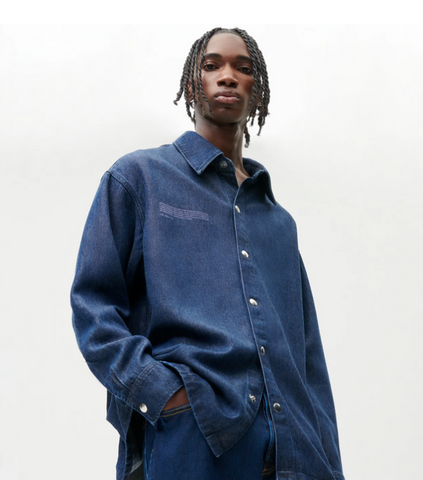
The materials science brand Pangaia, known for their cool and coveted 'comfort luxury' (notably their 365 matching tracksuits) is home to one of the first ever in-house research and development facility to fast-track sustainable textile innovations. Pioneers in the cross-over of fashion and science to implement next-gen fabrics, it's to not surprise that they are the first brand to launch a denim jacket made entirely from textile waste.
Pangaia Lab has partnered with Evrnu on the creation of a limited-capsule composed NuCycl, a fiber created from post and pre-consumption waste. Unlike recycled cotton, the fiber does not need to be welded with others, making it durable and possible to recycle up to 5 times. The collection is compromised of 20 pieces, including the eagerly awaited denim jacket (see picture below), which will be launching on the February 16 - sign up now for first access!
Shop secondhand designer knitwear and sweaters here.
5. Stella McCartney: First Regenerative Cotton T-Shirt & BioSequin Jumpsuit

For Summer 2023, Stella McCartney launched her most sustainable collection to-date. Made out of 91% conscious materials, the collection includes the world's first-ever t-shirt made from 100% regenerative cotton soured from SOKTAS (a family-owned cotton producer based in Turkey). S inaugural piece is
In short, regenerative farming is a game-changer for sustainable fashion because it prioritizes soil health, biodiversity, and carbon sequestration, leading to better quality fibers and reduced environmental impact. This helps to create a more sustainable and ethical fashion industry, benefiting both the environment and the livelihoods of farmers and their communities. SOKTAS have 100% traceability from farm to fiber, fabric to finished product. By 2025, Stella McCartney has committed to using 100% regenerative, recycled or organic cotton across all of their collections.
It doesn't stop there. Another special mention to Stella McCartney for launching the world's first garment made of "Biosequins," a new type of sequin created with biodegradable materials. The Biosequins will degrade in compost within 90 days, compared to traditional plastic sequins, which can take up to 400 years to decompose in the environment.
The sleeveless sequin jumpsuit made its debut in the April 2023 cover story of American Vogue – photographed by the legendary Annie Leibovitz on model, eco-activist and House friend Cara Delevingne.
Transparency & Traceability
6. Chloe: Digital Passports
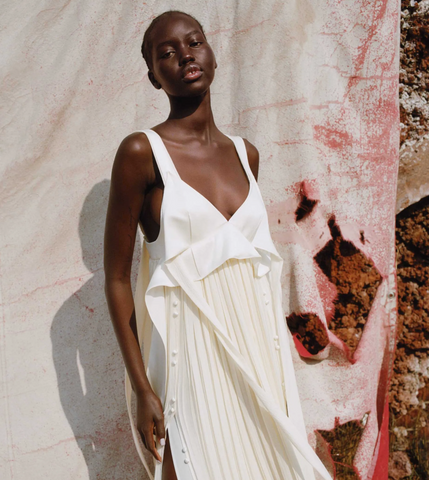
French luxury brand, Chloe, was the first ever luxury brand to be appointed their B-Corp status. Evidently, the brand has always been ahead of the game when it comes to sustainable practices and their Spring-Summer 2023 collection is no exception. Also know as 'Chloe Vertical', the collection marked the brand's launch of digital ID's. Digital ID's are amongst the newest sustainability trends to emerge in the fashion industry and Chloe is amongst some of the first designer brands to incorporate the technology into their collections.
Through a scannable QR codes embedded in the garments, users have access to all the information on the origin of the materials used, as well as advice on how best to care and repair the items in order to ensure their longevity. This is a big step towards beating green-washing by bringing more transparency to production chains.
The QR code even includes a link to resell the product directly on Vestiaire collective through an instant resale programme managed in full autonomy by the sellers. Resale made easy and immediately accessible, encouraging circularity from the get-go.
Written by
Thalia Guarnieri
Published at
-
-
- Choosing a selection results in a full page refresh.
- Press the space key then arrow keys to make a selection.









